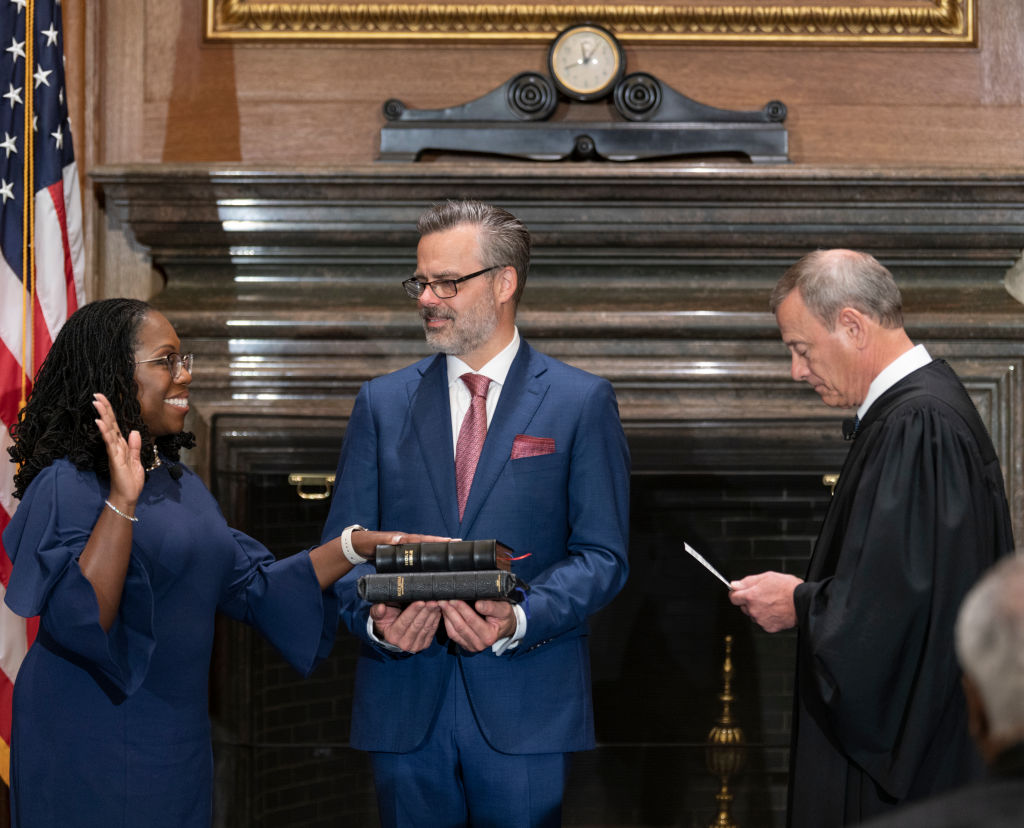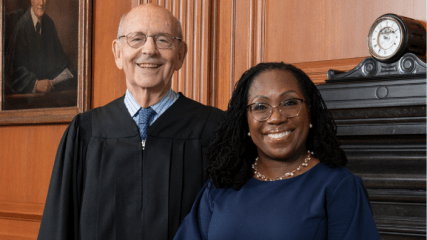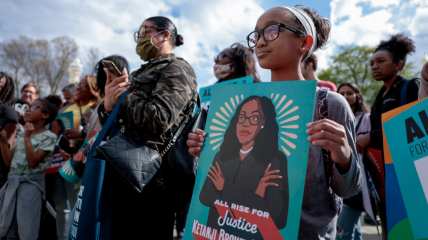Can Justice Ketanji Brown Jackson save the Supreme Court? (Hint: The answer is maybe)
OPINION: The notion that the new justice can save the court may sound preposterous. But her presence on the court matters because she will bring a unique perspective and help other justices see life through a different lens.

Editor’s note: The following article is an op-ed, and the views expressed are the author’s own. Read more opinions on theGrio.
When Justice Ketanji Brown Jackson was being sworn on to the nation’s high court last month, Twitter went wild with a meme showing Donald Glover as Troy Barnes in the TV Show Community, happily entering a room with boxes of pizza, only to find out that it is on fire with the people in the room running about wildly and rolling around on the floor.
The caption read: “Live shot of Ketanji Brown Jackson arriving at SCOTUS.”
And although the meme was meant to make us all laugh, it was also meant to give us all pause. To stop. To reflect and understand the historic significance of not just the first Black woman sitting on the nation’s highest court for the first time, but the serious decline of moral and ethical trust that we have always had as a nation in the Supreme Court since its inception in 1789.
The image of the court on fire is the image most of us have of the Supreme Court right now: a wild place, with the nine adult justices—arguably the smartest people in the nation—playing with matches, yelling, fighting and being out of control. The fact that we would even ask the question—can the nation’s first Black female justice save the court?—is telling in and of itself, as it gets to the very core of how we perceive Black women, dating back to the country’s founding.
Being a Black woman is a double-edged sword. We must carry both the burdens of race and gender with neither the benefits of being Black men nor white women. They’re both privileged in different ways. We have no such privilege. Instead, we must always contend with stereotypes, mythology and cultural perceptions of us as always being superheroes, who feel no pain and who have no needs. In many cases, we are viewed as hard hammers, devoid of emotions and empathy. Nothing could be further from the truth of who we are. And nobody displayed all of our wonderful and warm qualities better than Justice Jackson.
The trick for Justice Jackson will be this: Can she fill the shoes of her mentor, Justice Stephen Breyer—a liberal lion who served the court for almost 30 years as a center-left voice for equity, justice and the expansion of rights—and, at the same time, be more like the first woman justice, Sandra Day O’Connor, who staked out a more centrist view of justice, where Jackson can build coalitions across the hard right of the court (Clarence Thomas, Samuel Alito, Amy Coney Barrett) and the far left (Sonia Sotomayer) and work to find consensus on issues of race, gender, religion and other issues with justices like Neil Gorsuch, Brett Kavanaugh, Elena Kagan and Chief Justice John Roberts.
This notion that she can save the court is, of course, preposterous. Because adults cannot be saved or changed unless they want to be. However, the presence of a Black woman on the court matters because she will bring a unique perspective to debates, discussions and deliberations. She will be able to help other justices see life through a different lens. She will be able to have lunch, coffee and human connections with her fellow justices, which will allow them to form bonds that transcend race and gender. She will be a voice in the room, at the table, with equal power and status to shape a vision of what America still can be.
I see her as an Earl Warren-like figure. He was not a judge. He was a politician—a former governor of California appointed by a heroic former World War II general, President Dwight Eisenhower. Warren made Brown v. Board of Education a reality by using his life experiences to build bridges and unite perspectives. He understood that Brown had to be unanimous. That there could be no doubt that the nation’s highest court was condemning racial segregation.
Justice Ketanji Brown Jackson may not be able to save the court from its current fallen state, but she is going to be a new moral conscience of the nation on the court. She will model what all Black women of greatness before her have. She will be a liberator of her people like Harriet. An orator of conviction like Sojourner. She will be firm and resolute like Rosa. And she will be a great diplomat of the law like Constance Baker Motley.

Sophia A. Nelson is a contributing editor for theGrio. Nelson is a TV commentator and is the author of “The Woman Code: Powerful Keys to Unlock,” “Black Women Redefined.”
TheGrio is FREE on your TV via Apple TV, Amazon Fire, Roku, and Android TV. Please download theGrio mobile apps today!


